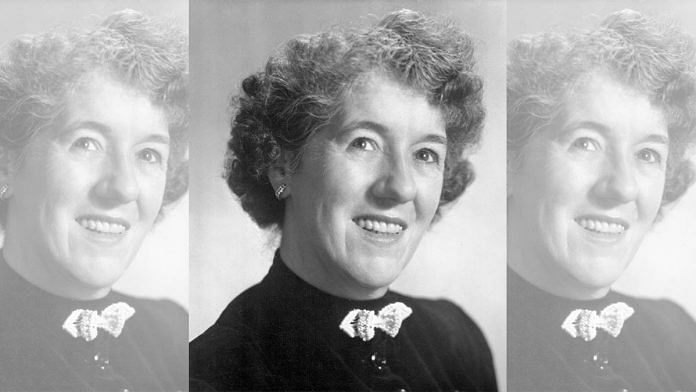New Delhi: Popular British author Enid Blyton, whose books have been read by children across the world, raked up headlines again after a UK-based charity flagged that her body of work has been criticised as racist and xenophobic.
On 17 June, English Heritage, a UK-based charity that manages over 400 historic monuments, buildings and places, updated its online description of Blyton and her work to include some “uncomfortable aspects”.
The website states: “Blyton’s work has been criticised during her lifetime and after for its racism, xenophobia and lack of literary merit”.
It offered Blyton’s book ‘The Little Black Doll’ as an example, in which one of the characters, Sambo, “is only accepted by his owner” once his black face is washed “clean by rain”.
Born in East Dulwich in 1897, Blyton briefly worked as a teacher and governess until April 1924, when she began writing children’s stories, books, poems etc. She wrote over 700 books and approximately 4,500 short stories, selling more than 600 million copies globally, and is best known for the books Noddy, Famous Five, Secret Seven, and Malory Towers. Blyton died on 28 November 1968.
Also read: These 6 children books by Dr. Seuss won’t be published again, over ‘hurtful & wrong’ imagery
‘Cancelling’ Enid Blyton
In its statement, English Heritage defended its updated description of Blyton’s work saying, “Our website entries aim to provide a fuller picture of each person’s life, including aspects that people may find troubling.”
It even updated its description of writer Rudyard Kipling, who authored The Jungle Book and short stories like The Man Who Would Be King, noting the “racist and imperialist sentiments” in his works.
However, the comments on Blyton’s work elicited a strong response from journalists, authors, celebrities and others across the world who refused to ‘cancel’ the renowned author and the “childhood memories” that her books provided.
“Like millions of readers whose imagination was fuelled by her books, there goes my childhood I guess. The world is a cruel place but the faraway tree & Malory towers had nothing to do with it,” tweeted actor-director Pooja Bhatt.
Meanwhile, British television personality Piers Morgan, who has been widely criticised for making racist comments, asked “woke” individuals to leave Blyton’s legacy alone.
In a column for Daily Mail last week, New Zealand journalist Dan Wootton defended Blyton from the recent backlash and elements of “cancel culture”.
“I have the faith that people can enjoy the work of someone while acknowledging their views are completely unacceptable but were developed in an unenlightened era,” he added.
Also read: No, cancel culture isn’t a threat to civilization
‘Old news’
Others on social media also asked why people are angry about “racial elements” in Blyton’s works today when it has been debated for the past three decades.
Radio host and novelist Sandip Roy highlighted this in a column for The Times of India Saturday. “All this to say that Enid Blyton’s fall from grace is not another example of today’s cancel culture run amuck, a woke attack on childhood pleasures, as some are suggesting. It’s old news,” he wrote.
Around 1917, Blyton worked briefly as a teacher and governess but by 1921 her stories and poems were appearing steadily in various magazines. Her first collection of poems, Child Whispers, was published in 1922 and she became a full-time writer from about 1924 onwards.
She faced very little criticism during her early years and it was only after World War 2 that her work was censured.
Most recently, the issue of racist, sexist and homophobic elements in her works came up in September 2019, when UK’s Royal Mint blocked plans for unveiling a 50 pence coin commemorating the author because the advisory committee found her to be “a racist, sexist, homophobe and not a very well-regarded writer”.
Blyton also landed in hot water for her literary depictions of golliwogs in works like Noddy. A golliwog is a doll-like character with a black face and frizzy hair that appeared in children’s books in the late 19th century and was later considered a racist caricature of coloured people.
Blyton’s commemorative plaque
Despite its claims against Blyton, English Heritage said there are “no plans” to remove Blyton’s blue plaque which was installed in 1997, 29 years after her death.
The plaque is located outside her former home at 207 Hook Road in London’s Chessington, where she started to develop her storytelling skills. The charity also said there are no plans to remove Kipling’s plaque either.
English Heritage, which was founded in 1983, runs London’s blue plaque scheme. A blue plaque is a permanent sign installed in a public place in the UK and elsewhere to commemorate a link between that location and a famous person, event, or former building on the site, serving as a historical marker.
(Edited by Rachel John)
Also read: World War 2 spy Noor Inayat Khan first Indian origin woman to get UK memorial plaque



